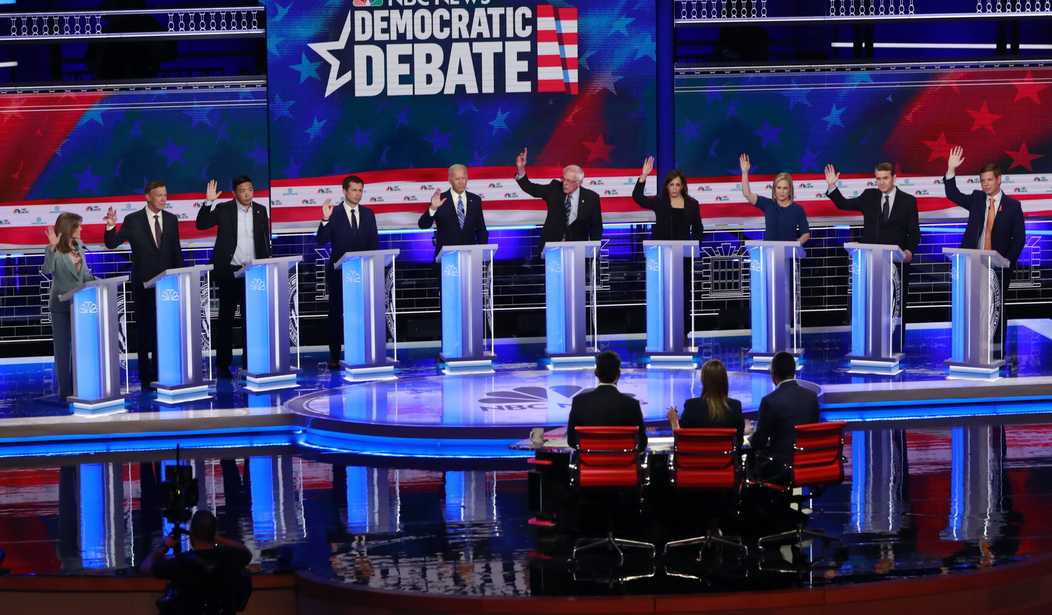On Thursday, CNN announced the matchups for the second round of 2020 Democratic debates, scheduled for Tuesday, July 30 and Wednesday, July 31. The spat between Sen. Kamala Harris (D-Calif.) and former Vice President Joe Biden dominated coverage of the first debate round, and Biden and Harris will face each other in the second round as well. Also notable will be the matchup between Sens. Elizabeth Warren (D-Mass.) and Bernie Sanders (I-Vt.).
Unlike in the first round of debates, there is not one clear “undercard night,” where most of the top-polling candidates are absent. To ensure this, CNN split the candidates into three groups depending on their polling and ensured each group would be split evenly between the two debates. Each night was guaranteed to feature two of the four top-polling candidates, three of the six middle-tier candidates, and five of the ten bottom-tier candidates.
Without further ado, here are the matchups, with the RealClearPolitics polling average for each candidate:
Night 1, July 30.
The first night includes: Bernie Sanders (15 percent); Elizabeth Warren (14.6 percent); South Bend, Indiana Mayor Pete Buttigieg (4.8 percent); former Texas Rep. Beto O’Rourke (2.8 percent); Minn. Sen. Amy Klobuchar (1 percent); author Marianne Williamson (N/A); former Maryland Rep. John Delaney (0.6 percent); former Colo. Gov. John Hickenlooper (0.4 percent); Ohio Rep. Tim Ryan (0.4 percent); and Montana Gov. Steve Bullock (0.8 percent).
Night 2, July 31.
The second night includes: Joe Biden (28.4 percent); Kamala Harris (12.6 percent); New Jersey Sen. Cory Booker (1.8 percent); former HUD Secretary Julián Castro (0.6 percent); businessman Andrew Yang (1.4 percent); Washington Gov. Jay Inslee (0.4 percent); Hawaii Rep. Tulsi Gabbard (0.6 percent); N.Y. Sen. Kirsten Gillibrand (0.6 percent); New York Mayor Bill de Blasio (0.6 percent); and Colo. Sen. Michael Bennet (0.8 percent).
Former Sen. Mike Gravel (D-Ala.) attracted enough donors to make the second round of debates, but because more than 20 candidates did so, he was excluded. Gravel has complained that not every poll includes him.
Rep. Seth Moulton (D-Mass.) and Wayne Messam, mayor of Miramar, Fla., did not make the first debate stage and will miss out on the second round of debates as well.
Billionaire climate activist Tom Steyer and former Rep. Joe Sestak (D-Penn.), who recently entered the presidential race, also failed to qualify for the debates.
Harris’ standout moment in the first round of debates came against Biden, when she went after the former vice president for opposing mandatory racial integration busing when she was growing up. Her story was misleading, but it gave her notoriety and a bump in the polls. Biden flaked, but he has another opportunity in the second round.
The matchup between Sanders and Warren will also be interesting. Both have a similar goal — pushing Democrats left on economic issues. Sanders has identified himself as a democratic socialist, while Warren claims to be a capitalist — yet their big-government policies are terrifyingly similar. They will have to attack one another, despite considering each other friends “forever.”
Buttigieg, who recently released an extreme affirmative action plan to pander to black voters, will seem sane by comparison.
As of now, the race has arguably tightened to a contest between five leading contenders: Biden, Sanders, Warren, Harris, and Buttigieg. It is possible a dark horse may emerge, but most likely the nominee will be one of these extreme five.
Follow Tyler O’Neil, the author of this article, on Twitter at @Tyler2ONeil.









Join the conversation as a VIP Member